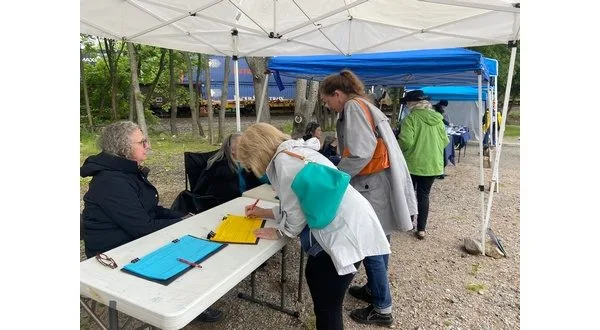
Voters sign a petition to place a measure on the Nov. 5 ballot at a signing event April 8, 2024, outside Little Rock’s Whitewater Tavern. (Paige Eichkorn / Arkansas Advocate)
Attorney General Tim Griffin on Wednesday substituted and certified the popular name and ballot title of a constitutional amendment proposed by the League of Women Voters of Arkansas aimed at preserving the state’s direct democracy process.
Griffin had rejected the proposal three times prior to Wednesday’s certification. In his most recent rejection, Griffin cited a new state law that prohibits ballot titles from being written above an eighth-grade reading level as his reason for denying certification.
In Wednesday’s opinion, Griffin said he previously did not approve the League of Women Voters’ proposal because it ranked at grade level 12.2 on the Flesch-Kincaid Grade Level formula. The test uses word complexity and sentence lengths to calculate what grade of education is needed to comprehend written material.
Additionally, the attorney general identified two other “minor issues” – a grammatical error in the text and the proposal’s “failure to mention any standards upon which a popular name could be challenged.”
Griffin noted in Wednesday’s opinion, which Assistant Attorney General Kelly Summerside prepared, that the League of Women Voters had corrected both issues and rewrote the ballot title so it ranks at an 8.5 grade level on the Flesch-Kincaid test.
“With regard to your proposed ballot title, I have made several minor changes to ensure that the ballot title clearly and accurately sets forth the purpose of your proposed initiated amendment to the Arkansas Constitution, while remaining at an eighth-grade reading level,” Griffin said.
The League of Women Voters of Arkansas and its ballot question committee, Save AR Democracy, said they were pleased with “this long-awaited approval,” in a statement issued Wednesday afternoon.
“This victory belongs to every Arkansan who believes in the power of the people to shape their own government,” said Bonnie Miller, president of the League. “Despite the challenges, we refused to give up because the right to direct democracy is worth fighting for.”
The League of Women Voters of Arkansas submitted its first proposal in March. The amendment’s goal is to “restore Arkansans’ constitutional right to direct democracy by preventing legislative interference, streamlining legal reviews, and simplifying the citizen-led petition process while ensuring that the fundamental rights of the amendment are subject to strict scrutiny by the courts in order to be valid,” according to a Wednesday press release.
Direct democracy is the process by which Arkansans can propose new laws or constitutional amendments and place them on the ballot for a statewide vote. Arkansas is one of 24 states that allow citizen-led initiatives, according to the National Conference of State Legislatures.
The nonpartisan LWVA, which submitted its most recent proposal on May 7, is proposing a constitutional amendment to prohibit state lawmakers from changing the Arkansas Constitution themselves and require that any new law affecting the initiative and referendum process must be approved by voters at the next general election.
Additionally, the ballot measure would only permit voters, not state lawmakers, to propose changes to Article 5, Section 1 of the state Constitution, the section that outlines the initiative and referendum process.
Under the proposed constitutional amendment, the General Assembly would determine the name and title of referendums, and votes on a bill with an emergency clause (a provision that allows laws to become effective immediately) would have to occur at least 24 hours after the bill passes.
Additional provisions of the proposal address the signature-gathering process, as well as the process for certifying and challenging ballot titles.
These reforms are essential to ensuring Arkansans can continue bringing issues “directly to the ballot without unnecessary obstacles,” according to the release.
“This is about protecting the voice of the people,” Miller said. “It should be the voters, not politicians, who have the final say in how Arkansas is governed.”
Preserving Arkansans’ right to propose state laws and constitutional amendments became a priority for several groups after lawmakers approved about a dozen bills related to direct democracy during the recently concluded legislative session. The bills’ sponsors said they will ensure integrity with the process, while opponents have argued the new laws make it nearly impossible for Arkansans’ proposed measures to qualify for the ballot.
The League of Women Voters of Arkansas filed a federal lawsuit in April alleging that eight of those laws are unconstitutional. Two ballot question committees, Protect AR Rights and For AR Kids, filed a motion to intervene in the case last week because they want to challenge additional laws not included in the original suit, including Act 602 of 2025, the law that prohibits initiative petitions from being written above an eighth-grade reading level.
Protect AR Rights also submitted its own proposed constitutional amendment Monday that would protect Arkansans’ “fundamental right” to direct democracy. Arkansas Advocates for Children and Families is a member of the Protect AR Rights coalition, and Executive Director Keesa Smith-Brantley said Monday that the group’s goal is for its proposal and the League of Women Voters’ to work together.
“There were things that we felt like we needed to equally add to make sure that we enshrine the rights of Arkansans in the Constitution, but we are hopeful to be able to work together in this process and talk about ways that we can make sure that both of the measures that we’re working on get passed,” she said.
Under state law, the attorney general’s office has 10 business days to approve or reject a proposed ballot measure. The deadline for a response on Protect AR Rights’ proposal is June 3.
To view this story, or for more news updates from Arkansas Advocate, click here.
WebReadyTM Powered by WireReady® NSI










